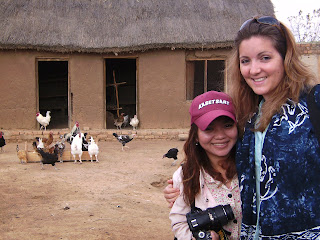Day 4 in Tanzania started with a breakfast of French toast, a fried egg, hot tea, and papaya. We then boarded the coaster and headed towards a poultry farm about 30 minutes away. When we got to the farm we were greeted by a group of young kids who were so cute and friendly. They are still a bit scared of “mzungu” and are hesitant to talk even when you speak Swahili. I asked Wilson, one of our locals, what he said to the kids because when he approached them they acted like old friends. Wilson said he only asked their names, whether they went to school, and how old they were. I tried the same strategy and got a little better success.
The poultry farm was interesting. It actually reminded me a little of Grant Family Farms – free range chickens feeding on fresh cabbage and maize, rolling in the dust and just being a chicken. The owner of the farm was so proud of his accomplishments – he started with 10 hens and one cock and now they have over 200 hens. He sells the eggs and meat to the locals and has been able to make a decent living for himself and his family. He has plans to grow the farm to over 3,000 chickens and serve even more Tanzanians. I asked him what his biggest disease concern was, to which he replied infectious coryza. I was surprised to hear that avian influenza, salmonellosis, and Mareks disease isn’t more of a concern in Tanzania. Currently there have been no documented cases of AI in Tanzania, but there are surveillance strategies and prevention efforts taking place. It was really interesting having the many animal health professionals weighing in on the farm owner’s operations and how he can improve his disease prevention and disease surveillance. Simple techniques such as separating animals by age and isolating diseased animals could really make a difference for this farm’s production.
Sukuman and me touring the poultry farm
After the poultry farm we headed towards the Veterinary Investigation Center of Tanzania. The VIC essentially plays the role of the USDA within Tanzania. They perform post-mortem exams and respond to disease outbreaks for the region surrounding Iringa. They try to educate local livestock owners about disease risks including zoonotic diseases such as Anthrax. It was amazing for me to see how much work they do and the challenges they face. For example, their facility was a simple building with a serology laboratory with one ELISA analyzer. They do necropsies “in house” only on small animals (piglets, cats, and chickens) and have to do larger animals in the field. Many times the facility loses electricity and has to postpone important surveillance work. Still, the VIC aims to report animal diseases within Tanzania based on the OIE classification.
From the VIC we headed towards Neema Café where we had lunch and got the story and a tour of this amazing place. Neema Café was started by a person from the U.K., and it provides disabled Tanzanians with a decent living by making crafts such as beads, elephant dung paper, and fabrics. The employees were so happy and, again, welcoming to our group of visitors. Many of the employees were deaf, so we learned a few expressions in sign language to communicate our appreciation and admiration for their work. Some of the other employees were victims of polio and were trained to use a hand looms because of their leg disfigurement. Neema Café was such a special place. It was heartwarming to see the positivity that radiated from this place. The workers were happy to be earning a wage, the guests loved the handicrafts and ambience, and the city has benefited from the tourism.
Mother and child busy at work at Neema Crafts, Iringa
After our lunch and tour of Neema, we had an opportunity to explore the markets of Iringa on our own. I was a little nervous at first to be set free in a town so foreign, but I quickly found my way and soon couldn’t get enough! I went into the food market where there was an abundance of fresh fruits, vegetables, beans, rice, and dagaa (sardines). I met a nice young man named Alex who allowed me to practice my Swahili. He was 20 years old and had learned English in secondary school, and he was very wiling to let me say my new phrases. I explained that I was there with a group of veterinarians to learn about the animals and ecosystem of his country. I introduced my friends Amelie and Sukuman to him as well. I purchased two tomatoes from him and even practiced my bargaining Swahili (Punguza bei?) to get him down to 150 Tsh. I ended up giving him 200 and leaving with a smile. Apparently Iringa is known for their fantastic tomatoes and onions – we’ll see if they live up to their reputation!
Tomorrow we leave the Riverside Campsite, and I am excited to enter the bush and be off the grid (no electricity, no wireless, limited access to a warm shower). I will continue to write even though my updates are less frequent. Goodnight!


I can't get enough of the photographs!
ReplyDelete